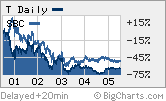 |
| Ma hasn't aged well: Shares of AT&T have been in a sharp decline for the past five years...but merger partner SBC hasn't fared much better. |
|
|
|
|
|
| �* based on ownership of 16.2602 shares of T on 12/30/83 ** based on closing prices as of 6/24/05 *** from sales of AT&T Wireless, AirTouch and MediaOne | | �Source:��Horizon Investment Services |
|
|
| More about telecom stocks
|
|
|
|
|
NEW YORK (CNN/Money) � It's the end of an era for AT&T.
Ma Bell investors are expected to approve the nearly $16 billion merger of AT&T (Research) with SBC Communications at AT&T's shareholder meeting in Denver on Thursday. And after regulatory review, the deal should close sometime in early 2006.
So this Thursday's meeting, the 120th in the company's history, is likely to be its last.
The stock is up nearly 30 percent in the past 12 months, thanks to takeover rumors that began to circulate at the end of last year and the announcement of the SBC (Research) purchase in January.
Should shareholders hang on to Ma Bell in order to get SBC stock, or hang up?
AT&T has had a rough couple of years. The company has been unable to stem losses of long distance subscribers due to intense competition from local phone companies and wireless carriers. This caused revenues and earnings to steadily decline.
And in another sign of how far AT&T had fallen, it was even thrown out of the Dow Jones Industrial Average in 2004 -- and was replaced by Baby Bell Verizon (Research).
What's more, an investment in AT&T since the company was broken up in 1984, while profitable, has not been that lucrative when compared to the broader market.
If investors held on to all of the shares they received from AT&T's numerous spin-offs, mergers of these spin-offs and even some spin-offs of the spin-offs, they would now own shares of 11 different companies, including SBC, Verizon and BellSouth, cable company Comcast, British telecom Vodafone and network equipment firm Lucent.
According to research from money management firm Horizon Investment Services, a $1,000 investment in AT&T would be worth $4,313.93 today. That's a 332 percent return. The S&P 500, however, has gained more than 620 percent during the same time frame.
Telecom's a tough business that's getting tougher
And SBC-AT&T faces an uncertain future, analysts say. Although SBC will gain an enviable list of corporate customers by purchasing AT&T, it will continue to face tough competition from cable companies offering phone service as well as telecom upstarts like Internet phone service provider Vonage.
AT&T has been fairly aggressive in launching its own Internet phone services, a technology known as voice over Internet protocol or VoIP. It has its own consumer VoIP product called CallVantage.
But VoIP may not be enough to rejuvenate AT&T's flagging voice business, said Patrick Brogan, director of research with independent tech and telecom research firm Precursor.
"For corporate customers, VoIP will cannibalize the traditional voice business. That's a negative for AT&T," Brogan said. "And on the consumer side, the take up rate of AT&T's CallVantage has been underwhelming."
And if competition with cable companies and smaller, more nimble rivals weren't enough, a combined SBC-AT&T is also likely to run into more pressure from Verizon, which is in the process of acquiring long-distance rival MCI (Research), said Todd Rosenbluth, an equity analyst with Standard & Poor's.
"The Bells will be competing with each other more than they have in the past," he said.
Another analyst points out that the one area of SBC that does have attractive growth prospects is its wireless division, Cingular, which it co-owns with BellSouth. But purchasing AT&T, which has no wireless business of its own, will lessen the percentage of sales from wireless for the combined company and therefore, slow the overall pace of revenue growth.
"SBC is resetting the dial and is probably going back to flat sales growth," said Greg Gorbatenko, an analyst with Marquis Investment Research. "Why should I invest in something that's not that exciting of a story?"
Not the end for AT&T?
So it probably doesn't make a lot of sense to be buying either AT&T or SBC stock right now. But selling might not be the best idea either. Rosenbluth has a "hold" on both stocks and said that for conservative investors, risk is minimized by the fact that SBC pays a substantial dividend, which yields 5.4 percent.
"The biggest benefit shareholders will receive is the dividend," said Rosenbluth. "Investors should accept what we view as an attractive yield until there is more clarity about the merger integration."
Yet, some think that the combined SBC-AT&T could be a tough force to reckon with in telecom. Jeff Kagan, an independent telecom analyst based in Atlanta, said that SBC should be able to boost its corporate business as a result of the deal.
"The weakest link for SBC is offering international service to business customers. This deal should make SBC stronger," said Kagan.
And even though the merger will put an end to Ma Bell's days as an independent telecom firm, it may be premature to plan a funeral for the AT&T name. SBC and AT&T have yet to say what will happen to the AT&T brand name.
Rosenbluth thinks SBC should keep it for its long-distance services. And Kagan said that it would be wise for SBC to just rename itself AT&T in order to take advantage of Ma Bell's long history.
"I wouldn't be surprised if SBC keeps the AT&T name. I can't imagine they would let the AT&T brand name fade away," he said.
For a look at more telecom stocks, click here.
Are Internet phone companies worth investing in? Click here.
Analysts quoted in this story do not own shares of the companies mentioned and their firms have no investment banking ties to the companies.

|